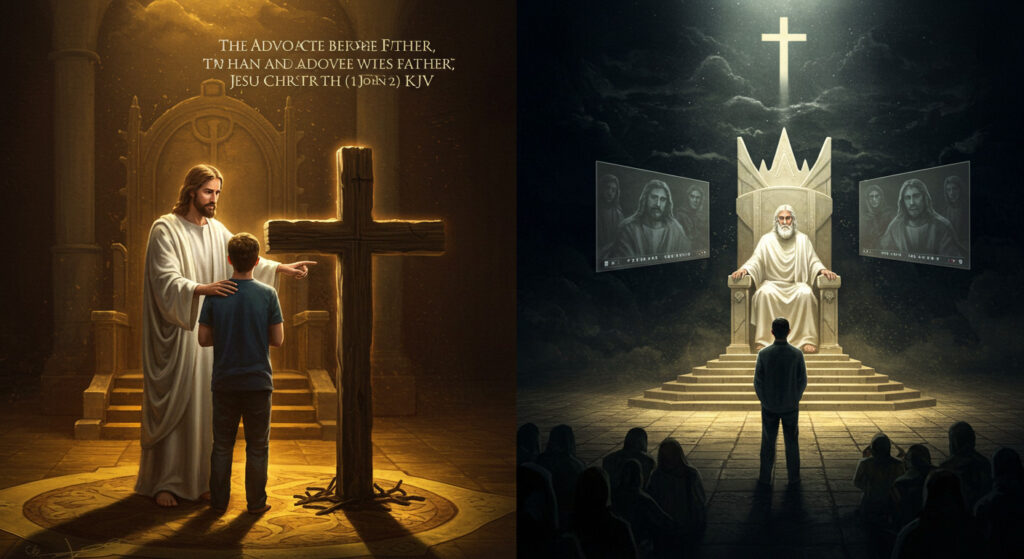💡 Devotional: Not Condemned — Forever Covered by Christ
Key Verse: Romans 8:1 — “So now there is no condemnation for those who belong to Christ Jesus.”
Salvation is not about how much you can change yourself — it is about Jesus taking the fall for your sins. When He died, He didn’t just pay for the sins you committed yesterday, or even today. He paid for all sin — past, present, and future. The cross was not a temporary solution; it was an eternal payment.
Paul said it clearly: “If righteousness could be gained through the law, Christ died for nothing” (Galatians 2:21). This means the Law can no longer be the measure of your standing with God. No matter how hard you try, you will never be holy by your own effort. That is why Christ came — because your righteousness comes from His blood, not from your behavior.
Think of it: Abraham was counted righteous, not because he kept the Law (the Law didn’t even exist yet), but because he believed God (Romans 4:3). David, even with blood on his hands, could say, “Blessed is the one whose sin the Lord does not count against them” (Romans 4:7–8). Why? Because righteousness has always been by faith, never by performance.
So whether you fail or succeed in keeping the Law, your standing with God does not change. You are not condemned. You are covered. You are justified once for all by the blood of Jesus.
🔥 Reflection
- Am I still trying to measure myself by the Law, or by what Jesus has done?
- Do I truly believe my sins — all of them — are paid for forever?
- When I fail, do I run back to rules, or back to Jesus?
🙏 Prayer
Father, I thank You that my righteousness is not by the Law but by faith in Jesus. Thank You that there is no condemnation for me, because Christ died once and for all. Help me rest in the finished work of the cross and walk in the freedom of Your grace. Amen.
Part 2
The Gospel of Grace
The gospel is built on the understanding that humanity is fundamentally unable to meet God’s perfect standard of righteousness. Our “good works” are not enough to earn salvation.
Ephesians 2:8-9: “For it is by grace you have been saved, through faith—and this is not from yourselves, it is the gift of God—not by works, so that no one can boast.”
This is the very essence of the gospel. God’s grace is His unmerited favor, a gift we did not deserve and could never earn. We simply receive this gift by placing our faith in Jesus’ finished work on the cross.
The Law’s Purpose
The Law was not given to save us, but to show us our need for a Savior. It exposes our sin and proves that we can’t be righteous on our own. This is why you feel that you “can’t still be holy per the laws no matter how hard you try.” That feeling is precisely what the Law was designed to produce: a profound awareness of our own helplessness.
Romans 3:20: “For by works of the law no human being will be justified in his sight, since through the law comes knowledge of sin.”
This is why the Apostle Paul was so passionate about this truth. He knew that if righteousness could be achieved by following the Law, then Jesus’ death would have been completely unnecessary.
Galatians 2:21: “I do not nullify the grace of God, for if righteousness were through the law, then Christ died for no purpose.”
A New Reality
Once you place your faith in Jesus, you are no longer under the Law as a system of earning salvation. You are under grace. You are a new creation in Christ. Your identity is no longer based on your flawed performance, but on His perfect righteousness that has been imputed to you.
The ongoing work of the Holy Spirit in your life is called sanctification. This is not you trying to be holy by yourself, but rather God working in you, giving you the desire and the power to live a life that honors Him. It’s a progressive journey of becoming more like Christ, not to earn your salvation, but because you already have it.
Part 3
The Gospel of Unburdened Righteousness
The gospel is a message that removes the weight from your shoulders. It teaches that salvation is a finished work, secured entirely by Jesus Christ. You don’t have to carry the burden of earning your way to heaven or of trying to become righteous on your own.
1. The Weight of Salvation is Already Lifted
The core of the gospel is this: Jesus Christ took the entire fall for your sins. He fulfilled every requirement of the Law so that you would not have to. Your salvation is not based on your ability to be “holy,” but on your faith in His complete and perfect sacrifice.
John 19:30: When Jesus had received the sour wine, he said, “It is finished,” and he bowed his head and gave up his spirit.
That phrase, “It is finished,” is the key to all of it. The price for sin was paid in full. There is nothing left for you to do to earn God’s forgiveness or acceptance. All that is required of you is to believe that He did it for you.
2. The Way to Be Better is Not by Trying Harder
Once you have received Christ, the desire to live a good life is natural, but the weight of doing it yourself is a burden you were never meant to carry. The Christian life is not about trying to be better in your own strength. It’s about surrendering to God’s power. This is where your prayers become the most powerful tool.
The “weight” is released when you understand that the Holy Spirit lives inside you. Your role is to pray, believe, and trust that He will work in you.
Philippians 2:13: “…for it is God who works in you, both to will and to work for his good pleasure.”
This verse tells you that it is God who gives you both the desire and the ability to do what is right. It’s a simple relationship of reliance: you pray to God, believing He will help you, and He works through you to produce goodness.
3. How We Will Be Judged in Heaven
The final judgment for a believer will not be a review of your sins. As we have seen, those were already judged on the cross. Instead, it will be a judgment of your service to God—what you did in response to His grace.
2 Corinthians 5:10: “For we must all appear before the judgment seat of Christ, so that each one may receive what is due for what he has done in the body, whether good or evil.”
The “good” works here are the ones God did through you, the “gold, silver, and precious stones” that come from surrendering to His Spirit. The “evil” or useless works are the “wood, hay, and straw” that you tried to do in your own strength. At the Judgment Seat, these will simply burn up, revealing what was truly done for God’s glory. The person is saved, but the works are not rewarded.
This judgment is not about condemnation; it is about accountability for the grace we were given. The only “weight” is this: Did you live a life of prayerful reliance on God, or did you try to do it all yourself? The reward is for the “good” works that God accomplished through you. Therefore, the best way to live for heaven is simply to pray, believe, and let God do the work.






